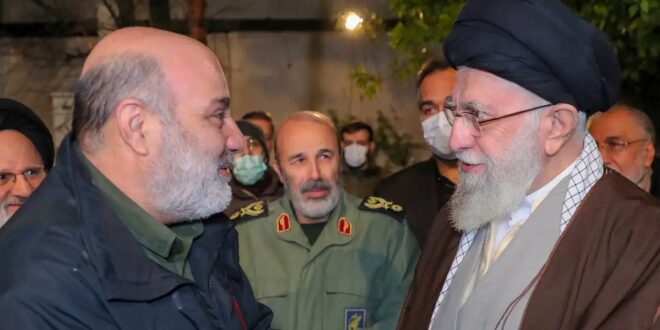A new report from Iran International said that the top commander of the Islamic Revolutionary Guards Corps (IRGC), Mohammad Reza Zahedi, was killed in an Israeli airstrike on the Iranian consulate in Syria on April 1. Zahedi, who was trying to evade Israeli targeting, had travelled from Tehran to Damascus via Lattakia on the day of the attack. The airstrike killed Zahedi and six other Iranian military advisers.
Zahedi was a prominent figure in the IRGC’s Quds Force, a unit designated as a terrorist organization by countries like the US and Canada due to its involvement in supporting militant groups such as Hamas and Hezbollah.
On the day before his death, Zahedi had moved from his hometown of Isfahan to Tehran, and then flew to Latakia, landing at a Russian military base protected by missile defense systems, before heading to Damascus.
This incident escalated tensions, leading Iran to retaliate by launching a significant missile and drone attack against Israel, which claimed to have intercepted most of the projectiles. The incident underscores the ongoing conflict and strategic military engagements in the region.
Iraq, Syria review security cooperation
The Iraqi Prime Minister, Mohammed Shia Al-Sudani, and the Syrian Minister of Interior, Mohammad Khaled Al-Rahmoun, discussed on Sunday strategies to enhance security cooperation between Iraq and Syria, IraqiNews.com has reported.
During their meeting in Baghdad, Al-Sudani emphasized the significance of boosting security cooperation between the two countries in different areas, particularly the fight against terrorism and drug trafficking.
The Iraqi Prime Minister also emphasized the importance of sustaining communication between security officials of the two countries to exchange information from intelligence agencies.
In order to improve security in Syria and along the shared border and to combat terrorism, Al-Sudani reaffirmed Iraq’s willingness to collaborate with the Syrian Ministry of Interior to the fullest extent possible, noting that this collaboration will have positive repercussions for regional stability.
Al-Rahmoun delivered the greetings of the Syrian President, Bashar Al-Assad, expressed gratitude to the Iraqi authorities for supporting Syria, and commended the Ministry of Interior for its efforts and the security measures it has put in place along the border between Syria and Iraq.
In a joint press conference following his meeting with Al-Rahmoun, the Iraqi Minister of Interior, Abdul Amir Al-Shammari, announced reaching a security agreement between the two countries.
Saudi Arabia executes two Syrian nationals for smuggling narcotics
Saudi Arabia has executed two Syrians over their alleged involvement in drug smuggling within the Kingdom, as the trafficking of narcotics from Syria continues to plague the region.
According to the Middle East Monitor, Ministry of Interior released a statement announcing the execution of two criminals of Syrian nationality on Saturday, 11 May, in the Kingdom’s north-western Tabuk region.
Having been caught by authorities for allegedly smuggling amphetamine pills on an unspecified date, the two Syrians – named Imad Mahmoud Hussein and Mustafa Mahmoud Hussein – were handed a decree confirming their guilt and subsequently sentenced to death. That ruling was upheld by the Court of Appeal and the Supreme Court, with a royal decree enforcing it.
In its statement, the Saudi Interior Ministry emphasised that the government is committed to combating narcotics of all kinds and the severe harm they cause to both society and individuals, as well as the authorities’ enforcement of the harshest penalties.
Over the past five years, at least tens of millions of Captagon pills – a type of amphetamine – have been seized throughout the Middle East, Europe, and North Africa, with Jordan and Saudi Arabia particularly being key destinations and transit locations for the trafficking operations.
A teacher inspires hope and learning amidst adversity
Al-Hol, northeast Syria – In the sprawling camp of Al-Hol, amidst basic living conditions and uncertainty, Rudayfah, a strong woman and mother of eight, found her calling as a teacher and a beacon of hope for children yearning to learn.
According to UNICEF, In 2019, she found an opportunity to work at a UNICEF-supported school in the camp as a teacher and has supported numerous children to continue their education.
“I am approachable to my students and try to deliver information in simple ways. In class, I rely on peer and group learning, and play as effective teaching methods,” she said. Her interactive lessons resonate deeply with her students and are equally admired by their parents. “I’ve heard from caregivers how my teaching has been effective for their children’s learning,” said Rudayfah.
Despite her demanding role as a teacher and mother, Rudayfah’s commitment to education remains unwavering. During the day, she teaches math, Arabic, and science to children, aged 6-12 years. Her children frequent the same school in the camp. In the afternoon, she supports her children to study at the tent they call home. “I’m grateful for my husband’s support along this journey and thankful for my colleagues at the school,” she said.
Rudayfah, 40, teaches her students by playing a game in class at a UNICEF-supported school in Al-Hol camp, northeast Syria.
Rudayfah’s aspirations for the children reach beyond the borders of the camp. “I wish all the children to leave the camp, return to their homes, and live what remains of their childhood outside these tents. And I wish to further excel as a teacher and help more children to continue learning,” said Rudayfah who continues to nurture young minds, supporting them to overcome difficult circumstances.
 Eurasia Press & News
Eurasia Press & News




